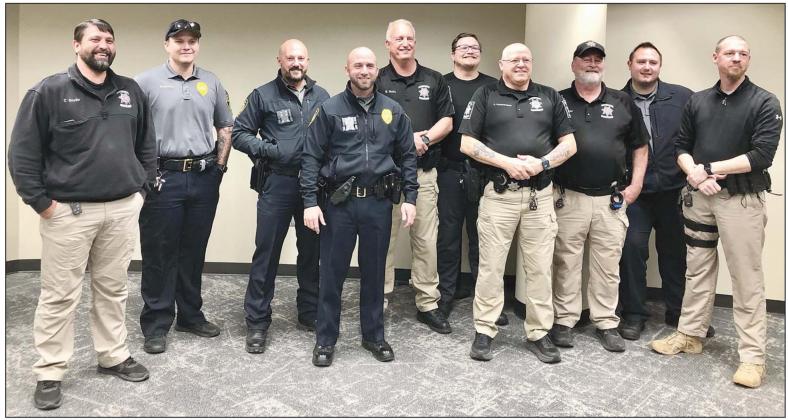Not a Matter of If, but When
Local training prepares officers for inevitable mental health crisis call
Sending one or more officers to a week-long, 40-hour training is a huge commitment for rural police forces where manpower may already be stretched thin.
But Kingfisher Police Chief David Catron and Kingfisher County Sheriff Dennis Banther are among those who believe last week’s Crisis Intervention Training at Chisholm Trail Technology Center was worth that investment.
“This is the second group of deputies we have sent through the CIT training with another group slated to attend in July,” Banther said.
“I only have three guys left (who haven’t attended the training) before I will have our whole department CIT certified,” Catron said.
Crisis Intervention Training is geared toward preparing law enforcement to safely de-escalate a potential mental health crisis, determine the need for emergency treatment and get the individual to professional treatment as quickly as possible.
The goal is to promote officer safety and reduce unnecessary use of force or arrests by teaching verbal de-escalation techniques appropriate to the type of symptoms observed.
Officers also carry iPads to allow them to immediately connect patients in crisis with a mental health professional in some situations.
The training is conducted by the state Department of Mental Health and Substance Abuse Services and is taught by a variety of instructors, including a psychiatrist, substance abuse specialist, social workers, police officers and representatives from the National Alliance on Mental Illness.
The training itself is offered at no charge to participating officers, but can still be cost-prohibitive when the cost of meals and travel are added to the expense of covering a week’s worth of shifts for officers in training.
That fueled a two-year push by Kingfisher Community Collaborative to bring CIT training to the county.
“The CIT training was suggested by (former KCC chairman) Lisa Copeland back in 2020,” Debora Maehs, KCC grantwriter, said. “We have been working for over two years to get this training held in Kingfisher County. We were put on a waiting list as there is a tremendous demand for this training.”
“This training is so critical and so dependent on law enforcement buy-in, that we wanted to make it as convenient and affordable as possible,” Copeland said.
So in addition to coordinating with the state mental health department to bring the class to the county during a time most convenient to local officers, KCC also provided meals and snacks to all participants.
That group included about 22 law enforcement representatives from Blaine, Canadian and Major counties.
The CIT approach is to foster a partnership between law enforcement, mental health providers, those who suffer from mental illness and their families, rather than an adversarial relationship.
Cathy Costello, who has become an advocate for mental health and wellness in the six years since her husband Mark was killed by their son during a psychotic episode in an Oklahoma City restaurant, was one of the presenters at the county program.
She also spoke Monday at KCC’s monthly meeting.
“Over the course of my son’s mental illness, he had multiple encounters with law enforcement,” Costello said. “Whether the officers were CIT trained or not made the difference between whether those encounters ended up with my son in treatment or in jail.”
Among other things, the training prepares officers to recognize behaviors specific to certain mental health diagnoses and adjust their response accordingly, Sheriff Dennis Banther said.
“In the past, we were always trained in a standard method or one way for all disorders,” he said. “This training teaches officers to observe factors the individual is portraying that they then know how to react in a manner not to aggravate them.”
Costello said families of mentally ill patients in crisis can call 911, provide information about the patient’s specific diagnosis and request a CIT officer to respond.
CIT-trained officers also know how to recognize a person in distress and how to intervene in a nonthreatening way and get the person connected to professional help as quickly as possible, Costello said.
Current KCC Chairman Brittney Hladik said the organization intends to bring the training back to the county to make it available to more officers.
Costello said once agencies and officers recognize the value of CIT training as Kingfisher County Sheriff’s Office and Kingfisher Police Department have, demand for the class continues to grow.
“With every group of officers I speak to, I always start by asking for a show of hands of who responded to a mental health crisis during their first week on the job, their first month, their first six months,” she told KCC members.
“By the time I get to one year, every hand in the room is raised.
“It’s not a matter of if an officer will be confronted with that situation, it’s just when.”





![PARTICIPANTS IN the CIT training at Chisholm Trail Technology Center take a break for lunch provided by Kingfisher Community Collaborative. [Photos Courtesy Lisa Copeland] Not a Matter of If, but When](https://www.kingfisherpress.net/sites/kingfisherpress.etypegoogle10.com/files/styles/article400/public/c8915629_Ar00101004.jpg?itok=br4Y8NhW)